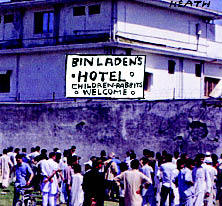Karachi is a notoriously lively city, with gun battles on the streets a daily occurrence — so it seems only sensible to stay in the comfort and safety of the Sind Club, a grand institution built during British rule in the centre of the town.
Karachi is a notoriously lively city, with gun battles on the streets a daily occurrence — so it seems only sensible to stay in the comfort and safety of the Sind Club, a grand institution built during British rule in the centre of the town. It was here that my travelling companion, Charles Alexander, and I watched the royal wedding in Urdu in company with elderly members. I blubbed as we joined in the hymns, but when it was all over it did seem odd that there had been no kiss. Ah, we said to each other sagely, they’re determined not to recreate the Diana moment. Later consultation with London revealed that there had indeed been plenty of kissing but it had been edited out locally on decency grounds.
The purpose of our journey is to research a book on Pakistan cricket. Qamar Ahmed, the well-known Pakistan cricketer (now a cricket writer) who has the momentous distinction of having got out each one of the five famous Mohammed brothers in the course of his first-class career, took me round. We had an exhilarating net with the members of the Karachi gymkhana before visiting Moin Khan’s cricketing academy, which opens formally next month. Moin Khan was wonderful; grateful for his brilliant career rather than arrogant about it. With people like him, Pakistani cricket has a very promising future.
On to Lahore with plans to examine the archives of the Pakistan Cricket Board. These plans changed dramatically, however, when I switched on the morning TV to discover that Osama bin Laden was dead. It was a seven-hour journey to Abbottabad, where he met his end, but eventually we arrived in this entirely peaceful town. The rest of the world may have been filled with fascinated apprehension at the death of the world’s most wanted man, but in Abbottabad people were just going about their ordinary lives, drinking tea and generally uninterested in the remarkable event which had taken place a few hours earlier.
Inspection of the bin Laden compound — a house flanked with poplar trees which swayed gently in the summer breeze — raised two immediate questions. First, why was Osama bin Laden killed? There were no signs of violent military action. The American special forces, who witnesses said spoke fluent Pashto, had entered easily. Might it not have been better to take Osama alive and place him on trial in New York? President Obama’s claim that justice has been done is suspect. It is, admittedly, too early to leap to judgment. It may well be that his own people killed him, as it is well known that Osama’s old bodyguard, Abu Jandal, had been ordered to shoot his boss dead if there was ever any danger of capture. The situation must be cleared up; we need a new Hugh Trevor-Roper to establish the facts and write a modern classic about the last days of bin Laden.
What is obvious is that the Pakistanis must have known that Osama was there. His was a very conspicuous house in the middle of a garrison town and barely a mile from the local military academy. The United States insist that the Pakistani state knew nothing about the operation but I don’t believe that can be true either. My hunch is that the ISI lured Osama down from the hills and the American special forces did the rest. If so, this is a cheerful moment for the troubled US-Pakistan relationship and could well open the way to a new and much happier period.
As I walked round the compound, I noted some surprising features. First there was an advertisement on the bin Laden wall for the local girls’ school, the Jamia Girls’ College, which seems counter-intuitive given al-Qa’eda’s notorious opposition to female education. And there was the wild cannabis outside, which sent out a lingering aroma in the boiling heat.
From Karachi came some very shaming news concerning Abdul Sattar Edhi, the great Pakistani social worker. Mr Edhi had been invited to receive a very important prize from Ahmedi humanitarian organisation in London. He was just setting off to receive it when he learnt that the British Consulate has refused to give visas to his two daughters, without whom, at the age of 82, he cannot travel. The low-grade behaviour of which the British state is capable never ceases to amaze me.
News came through from Newmarket that the Henry Cecil-trained Frankel had won the 2000 Guineas by a record margin. The Henry Cecil story is one of the greatest in world sport. Twenty years ago he was the country’s leading trainer. Then his whole world fell apart — his marriage broke down, his beloved twin brother died and his horses melted away. This victory cements the amazing revival in the Cecil fortunes over the last few years. Henry Cecil is a man held in enormous affection and it is past time that he should be given a knighthood.
Peter Oborne is the chief political commentator at the Daily Telegraph.






Comments